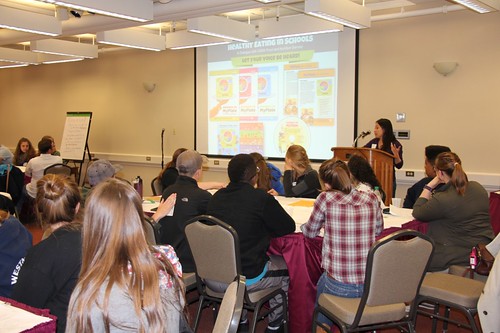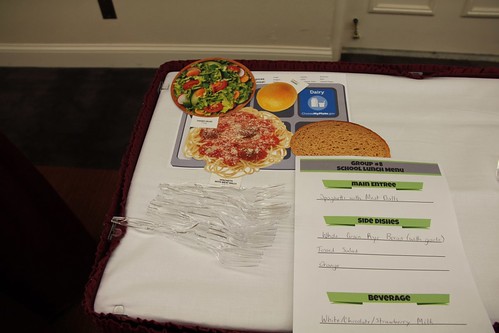
One key strategy in helping schools serve nutritious and appealing meals that students will eat is to simply ask, “What do you need?”
On April 9, USDA Food and Nutrition Service (FNS) asked this simple yet compelling question to nearly 40 4-H delegates at the 2016 National 4-H Conference in Chevy Chase, Md. USDA FNS hosted the roundtable session, “Healthy Eating in Schools: A Dialogue with USDA Food & Nutrition Service,” in an effort to give eager student leaders a chance to share their views on school meals and healthy eating. Participants came from all across the U.S. states and territories, from Nebraska to North Carolina, and as far away as Puerto Rico and a U.S. Air Force base in Japan.
“I was able to have a say in our lunches. I feel that a direct contact discussion, such as today, would be important to hear what students have to say.” – Student, age 15, Connecticut
4-H delegates were asked a series of questions to gauge their thoughts and experiences with school meals. They responded passionately and expressed excitement about incorporating local foods into their school menu and recommended more fresh fruits and vegetables in their cafeterias. Students also shared their breakfast and lunch preferences and offered ideas to increase School Breakfast and School Lunch participation in schools. USDA will add the students’ unique responses and perspectives to its growing arsenal of feedback and suggestions from schools, parents, and administrators. We frequently use these recommendations to enhance USDA’s Child Nutrition Programs and develop resources and guidance materials for program operators.
After 30 minutes of thought-provoking roundtable discussions, 4-H delegates took a small break and competed in the “USDA Top Chef School Lunch Challenge.” Delegates were instructed to assemble a nutritious and appealing school lunch tray and menu using a kit of colorful food models from all five food groups. After five minutes of meal planning, students presented their school lunch trays and menus on the “USDA Top Chef” buffet table. Students used forks to vote for their favorites by placing one next to their top choice. The winner with the most forks was an oldie but goodie: spaghetti with meatballs. However, we would like to give a shout-out and honorable mention to a very creative menu: “Ir’roast’istible Beef with Local Corn on the Cob, Sweet Nectarine, Whole Wheat Roll, and Legend ‘Dairy’ Milk”.
To further engage students in school meals and nutrition, USDA presented Team Nutrition resources as tools to help 4-H delegates improve nutrition in their schools and communities, as well as among their peers. Team Nutrition’s newest hands-on resource kit for summer meal sites was also highlighted as yet another resource 4-H youth can use when engaging in leadership activities in their communities. “It made me realize just how much I could do in my school to help students live a healthier lifestyle and gave me a list of programs and ideas to take back and share with the community.” – Student, age 17, Puerto Rico
This roundtable session gave students the opportunity to learn from each other and opened up their eyes to just how much school meals and school environments vary from location to location. Many participants were excited about some of the school meals promotion activities happening in other schools and expressed interest in trying out those ideas in their own schools and engaging other students in the process. They left the session feeling inspired to make a difference in schools. “Personally, this session has inspired me to work towards starting new programs [about healthy eating] within my local high school.” – Student, age 18, Connecticut
We are excited to see what will transpire next as students bring their tools and ideas back to their school cafeterias. This 4-H youth roundtable session was yet another way USDA is offering technical assistance, listening to school meals program participants, and promoting a healthier school environment. USDA is committed to enhancing our school meal programs and maximizing benefits for meal program participants across the country. We will continue to gather feedback from our hungry and active end-users. Students have a voice, and USDA is listening.

